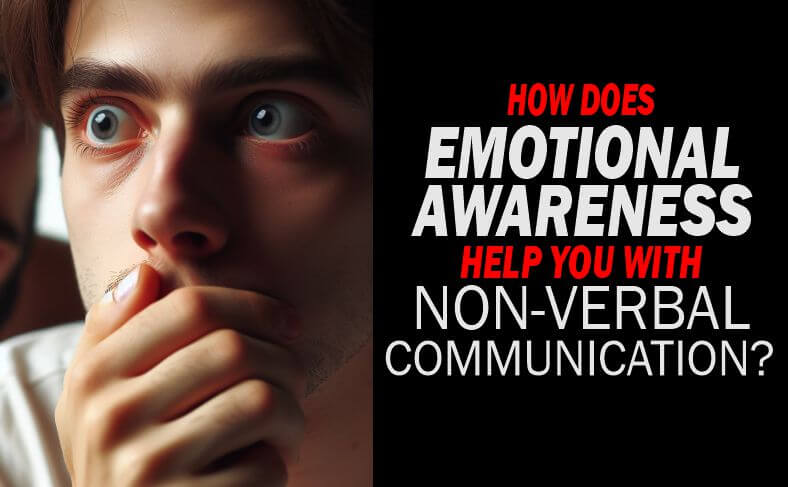Unlock the hidden power of emotional awareness in non-verbal communication. Discover how your emotions shape body language and reveal unspoken truths in every interaction.
Non-verbal communication is the unspoken language of human interaction. Facial expressions, body posture, gestures, and tone of voice often reveal more than words ever could.
But how do you decode these signals accurately?
The answer lies in emotional awareness. When you understand your emotions, you naturally become better at interpreting and responding to the emotions of others.
This skill strengthens relationships, improves social interactions, and prevents misunderstandings.
You might want to pin the image below.

Understanding Emotional Awareness in Non-Verbal Communication
Emotional awareness is the ability to recognize, understand, and manage your emotions.
It involves being mindful of what you feel and how those emotions influence your expressions, tone, and body language.
When you cultivate emotional awareness, you become more conscious of how your feelings shape your non-verbal cues and how you perceive those of others.
Think about a time when you were upset but didn’t express it verbally. Did your body language shift?
Maybe you crossed your arms, avoided eye contact, or sighed heavily. Even without saying a word, your emotions were communicated.
When you are aware of your emotions, you can better control these involuntary signals and use them to convey messages more effectively.
The Link Between Emotional Awareness and Reading Non-Verbal Cues

Emotions are deeply connected to non-verbal communication. When you are emotionally aware, you can:
- Recognize Emotional Cues in Others – When someone says they’re fine but their tone is tense and their smile is forced, emotional awareness helps you pick up on the discrepancy.
- Adjust Your Responses – If you sense discomfort or anxiety in someone’s posture or facial expression, you can respond with reassurance or empathy.
- Avoid Misinterpretations – Sometimes, non-verbal cues can be misleading. Being emotionally aware helps you consider context before jumping to conclusions.
Related Posts
Tips on Emotional Management at Your Workplace
Fortifying Your Life with Emotional Mastery
How to Excel with Self-awareness in Leadership
Obvious Signs of Lack of Self-awareness
How Emotional Awareness Builds Stronger Connections
Emotional awareness makes your non-verbal communication more authentic and relatable.
When you genuinely understand your own emotions, you naturally express them in a way that aligns with your words.
This consistency builds trust and strengthens personal and professional relationships.
Imagine having a conversation with someone who nods occasionally, maintains steady eye contact, and mirrors your expressions.
You’d likely feel understood and valued. Now picture someone who avoids eye contact, taps their fingers impatiently, and shifts in their seat.
Their words may say, “I’m interested,” but their body language suggests otherwise.
Emotional awareness helps align your verbal and non-verbal messages, making communication more genuine.
The Role of Empathy in Non-Verbal Communication

Empathy, a core aspect of emotional awareness, allows you to tune into others’ emotions and respond appropriately.
When you recognize sadness in someone’s slumped shoulders or hear frustration in their sigh, you can offer support without them needing to verbalize their feelings. This makes interactions smoother and more meaningful.
Practical Ways to Show Empathy Non-Verbally:
- Maintain Eye Contact: It signals attentiveness and respect.
- Use Mirroring: Subtly matching someone’s gestures or expressions creates a sense of connection.
- Adjust Your Tone: A calm, steady voice can soothe anxiety, while an energetic tone can encourage enthusiasm.
- Respect Personal Space: Understanding when someone needs closeness versus distance prevents discomfort.
Emotional Awareness Helps You Detect Hidden Emotions

Not all emotions are expressed openly. Some people hide their feelings due to cultural norms, fear, or personal reasons.
Emotional awareness helps you notice subtle cues like microexpressions (brief facial expressions that reveal emotions before they are masked), voice pitch changes, or a sudden shift in body language.
For example, a slight hesitation before answering a question might indicate uncertainty.
A forced laugh could mean someone is masking nervousness. By staying attuned to these small details, you gain a deeper understanding of people’s true emotions.
Emotional Awareness and Emotional Intelligence
Emotional awareness is part of emotional intelligence (EQ), which includes self-awareness, self-regulation, motivation, empathy, and social skills.
When you strengthen your EQ, you enhance your ability to express and read non-verbal cues effectively.
Ways to Improve Emotional Intelligence for Better Non-Verbal Communication:
- Practice Self-Reflection: Take time to analyze your emotions and how they influence your interactions.
- Develop Active Listening Skills: Pay close attention to both words and body language.
- Regulate Your Emotions: Learn to control reactions to avoid sending unintended non-verbal signals.
How Emotional Awareness Boosts Confidence in Non-Verbal Communication
Confidence in communication isn’t just about what you say but also how you say it. When you understand your emotions, you project self-assurance through non-verbal cues such as:
- A relaxed posture
- Open gestures
- Steady, measured breathing
- A warm, engaging facial expression
Confidence makes interactions smoother, helping you leave a lasting impression in both personal and professional settings.
Practical Tips to Improve Emotional Awareness and Non-Verbal Communication
- Practice Mindfulness – Being present in the moment helps you recognize emotions as they arise.
- Observe Others – Pay attention to non-verbal cues in conversations and see how they align with verbal messages.
- Record Yourself – Watching your expressions and gestures can reveal unconscious non-verbal habits.
- Ask for Feedback – Friends or colleagues can provide insights on how your non-verbal communication is perceived.
- Engage in Emotional Labeling – When you feel an emotion, name it. This strengthens emotional awareness.
Final Thoughts
Emotional awareness isn’t just a skill; it’s a key to unlocking better communication. By understanding your emotions, you gain insight into the emotions of others, making your interactions more meaningful and authentic.
The ability to read and express non-verbal cues accurately strengthens relationships, minimizes misunderstandings, and fosters deeper connections.
So, next time you engage in a conversation, pay attention to the unspoken messages.
What is your body language saying? Are you picking up on the hidden emotions in others?
By sharpening your emotional awareness, you’ll transform the way you communicate without saying a word.
References:
- https://www.quora.com/How-does-emotional-awareness-help-you-with-non-verbal-communication?top_ans=47080532
- https://businessday.ng/reality-bites/article/enhancing-communication-skills-through-emotional-awareness/
Pious Clements is the insightful voice behind "The Conducts of Life" blog, where he writes about life ethics, self-development, life mastery, and the dynamics of people and society.
With a profound understanding of human behaviuor and societal dynamics, Pious offers thought-provoking perspectives on ethical living and personal growth.
Through engaging narratives and astute observations, he inspires readers to navigate life's complexities with wisdom and integrity, encouraging a deeper understanding of the human experience and our place within society.
